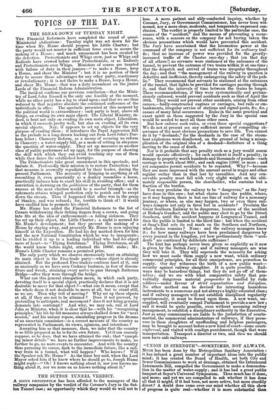TOPICS OF THE DAY.
THE BREAK-DOWN OF TUESDAY NIGHT. TzE Financial Reformers have completed the round of quasi- Ministerial abdications : Tuesday night was set down for the time when Mr. Hume should propose his Little Charter; but the party would not muster in sufficient force even to secure the making of a House ; and much amusement has been created by the defection. Protectionists and Whigs crow, just as Whigs and Radicals have crowed before over Protectionists, or as Radicals and Protectionists over Whigs. Ministers of course are taunted with failure of duty in their juniors—" to make a House, keep a House, and cheer the Minister " : but it is no portion of their duty to secure those advantages for any other party, reactionary or revolutionary ; it is not theirs to make a House, keep a House, and cheer Mr. Hume—that was a duty incumbent on the junior Lords of the Financial Reform Administration. The incident confirms our previous conclusion—that the Minis- try of Lord John Russell is the only one feasible at the moment, while no other party has a leg to stand upon; and that we are thus reduced to that negative absolute the continued sufferance of the individuals in office. The spectacle presented at this moment by the political world is extraordinary, each party is bent, above all things, on evading its own main object. The Liberal Ministry, in- deed, is bent not only on evading its own main object, Liberalism, in which it succeeds pretty well, but also on evading all its own special objects. Nay, it appears to set up objects for the very purpose of evading them : it introduces the Papal Aggression Bill as the prelude to a long-drawn backing out from Lord John's Dur- ham letter; Chancery Reform, as a means of securing no reform in Chancery; a water-supply bill, as a mode of setting in abeyance the question of water-supply. They set up measures as another class of public performers set up eggs, for the purpose of showing the skill with which they can avoid touching any one of them while they dance the established hornpipe. The Protectionists take great amusement in this spectacle, and imitate it. Professedly their mission is to restore Protection ; but that measure is avowedly repudiated by their leader, during the present Parliament. The necessity of bringing in anything at all resembling it, even generically as a donkey resembles a horse, practically induces him to exert his skill in avoiding office ; and a conviction is dawning on the politicians of the party, that for them success at the next election would be a mortal triumph—as the ephemeris attains winged perfection only to perish and be swept down the stream. Thus it happened that office was in the grasp of Stanley, and was refused; for, terrible to think of ! it would have enabled him to promote his object.
Mr. Hume has added the Financial Reformers to the list of Caesars withdrawing their itching fingers from a crown, and going into fits at the idea of enthronement—a falling sickness. They too set up their object, the Little Charter ; a night is secured for Mr. Hume's development ; but they prevent the making. of a House by staying away, and presently Mr. Hume is seen enjoying himself at the Exposition. He had his day marked down for him and the new National Constitution which he was to inaugurate ; but he yielded it up to a leading individual who had his object more at heart—to "Flying Dutchman." Flying Dutchman, as all the world knew before night, attained the 10001. stake ; Mr. Hume's Little Charter remains a promised prize.
The only party which we observe strenuously bent on attaining i its main object is the Free-trade party—whose object is already attained. But the professed Free-traders continue hard at it, and as anxiously as we have seen Cockney boatmen, in fear of discom- fiture and wreck, straining every nerve to pass through Battersea Bridge—after they were through the bridge. What can this general abnegation mean, in which each party, devoting itself to a special object, practically declares that it is not desirable to move for that object ?—what can it mean, except that the whole deem it not desirable to move at all, but to stand still, as we are. Then why talk of moving? Why set up these objects at all, if they are not to be attained ? Does it not prevent, by pretending to anticipate, real movement ? does it not bring genuine demands into contempt ? And why, we may ask, rail at Lord John as Minister, when it is clear that he—with his "recognizing principles," his bit-by-bit measures always chalked down for "next session," and his uneasy repose, simulating progress in the dreams of an uncertain conscience—is a correct measure of the country as represented in Parliament, its views, opinions, and intentions ? Accepting him as that measure, then, we infer that the country is as little prepared as he is for its own future. Yet it can scarcely suppose, as he does, that we have attained the end ; that "except- ing minor details " we have no further improvements to make, no further to go, no more events to encounter. And with the country thus pursuing its career, dark to the immediate future, like a rail way train in a tunnel, what will happen ? Who knows ? Will the Speaker ask Mr. Hume ? As the blasé boy said, when the Lord Mayor asked him if he knew where he should go to, Joseph Hume might reply—" Oh ! I knows nothing about it, nor you knows no- thing about it, nor we none on us knows nothing about it."


























 Previous page
Previous page